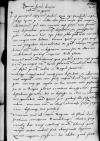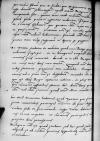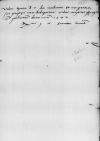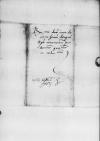Quia ego iam dudum nihil scripsi Reverendissimae Paternitati Vestrae, nulla alia fuit causa, quam inopia tabellariorum. Quando vero occurrere visi sunt, tum summis curis distinebar, quominus desiderio suo satisfacere potui. Ac tamen licet ego silere soleo, quod certe evenit cum magno meo dolo ms. e(!)
⌈oo ms. e(!)
⌉re, verum Reverendissimae Paternitati Vestrae pro eius in me singulari benevolentia et gratia libentissime servio. An licet autem adire in despectum animi sui et illorum candidatorum, quibus maxime aula placet?
Novarum rerum nihil habemus, quae scribenda putem, nisi quod ⌊serenissimi principes⌋ nostri bona fruuntur incolumitate et ante festum Pentecostes redire in ⌊Regnum⌋ statuerunt. Vacantiae magistratuum nondum sunt distributae et adhuc maiores augentur, nam non pridem magnificus dominus ⌊capitaneus Samogitiae⌋ mortuus est, caput in ⌊hoc ducatu⌋ non postremum. Sic et in ⌊Regno⌋ plures senatores decesserunt, quorum distributio speratur hic in discessu et illic orig. illuc⌈illicillic orig. illuc⌉ in adventu. Non ignorabit autem Reverendissima Paternitas Vestra, quibus illa subsellia cedent, veremur autem, ne illius Callimachi sententia sequeretur, defunctis his patribus.
Venerunt etiam ad ⌊maiestatem regiam⌋ ab illustrissimo domino ⌊Ioachimo marchione Brandeburgensi⌋, electore ⌊imperii⌋, nuntii duo, unus catholicus et alter Hebraeus, quod numquam antea auditum fuit ⌊Hebraeos⌋ mitti legatum. Qua res magnam suspicionem hic edidit, quod forte  BCz, 1599, p. 134 per medium ⌊illustrissimae suae dominationis⌋ ⌊Iudaei⌋, qui ex ⌊Germania⌋ expulsi esse dicuntur, sollicitassent apud ⌊maiestatem regiam⌋ pro receptaculo suo, quam rem male audiunt multi, etiam quod forte ⌊Pruteni⌋ assentire videntur, praecipue ⌊domini⌋ et ⌊senatus
Gedanens(is) or Gedanens(es)⌈Gedanens(is)Gedanens(is) or Gedanens(es)⌉⌋, qui gentem illam maximo favore prosequuntur. Secretam enim ipsi nuntii apud ⌊prin hidden by binding⌈[in]in hidden by binding⌉cipes⌋ nostros audientiam habuerunt, proinde nihil certi scribere hidden by binding⌈[re]re hidden by binding⌉ praeter eam vulgi suspicionem Vestrae Reverendissimae Paternitati possum.
BCz, 1599, p. 134 per medium ⌊illustrissimae suae dominationis⌋ ⌊Iudaei⌋, qui ex ⌊Germania⌋ expulsi esse dicuntur, sollicitassent apud ⌊maiestatem regiam⌋ pro receptaculo suo, quam rem male audiunt multi, etiam quod forte ⌊Pruteni⌋ assentire videntur, praecipue ⌊domini⌋ et ⌊senatus
Gedanens(is) or Gedanens(es)⌈Gedanens(is)Gedanens(is) or Gedanens(es)⌉⌋, qui gentem illam maximo favore prosequuntur. Secretam enim ipsi nuntii apud ⌊prin hidden by binding⌈[in]in hidden by binding⌉cipes⌋ nostros audientiam habuerunt, proinde nihil certi scribere hidden by binding⌈[re]re hidden by binding⌉ praeter eam vulgi suspicionem Vestrae Reverendissimae Paternitati possum.
De ⌊Turca⌋ scribitur et auditur, quod cum ⌊rege Persarum⌋ indutias suscepit et in ⌊Hungariam⌋ occupandam omnes conatus suos convertit, deinde et in alia regna Christiana. ⌊Cuius⌋ votis Deus non annuat. Quicquid autem Deus de nobis statuerit, proximum ver indicabit. ⌊Hungari⌋ hactenus adhuc sunt inter se dissidentes, ⌊Monacho⌋ illo auctore hidden by binding⌈[e]e hidden by binding⌉, qui est illius ⌊regni⌋ extrema iactura et plus ⌊Turcae⌋ quam Christianis affectibus favere dicitur. Dominus Deus perdat ⌊illum⌋ vel odium suorum, quod contra illum committet, det.
Hic etiam rumorem habemus, quod ⌊Tartari⌋, qui firmati sunt muneribus ⌊principum nostrorum⌋ de pace observanda hidden by binding⌈[a]a hidden by binding⌉, violata fide et iure iurando, iussu ⌊Turcae⌋ deberent nos armis impetere, ne Christianis principibus aliqua hidden by binding⌈[a]a hidden by binding⌉ praesidia dare potuissemus.
Reliquum nihil est, quod scribam, sed hoc quod scribo, est aliquid, si ab omnibus penitius expendend(is) i(m)minen(tii)s res venerint.
 BCz, 1599, p. 135
BCz, 1599, p. 135
Valeat Reverendissima Paternitas Vestra diu incolumis et me gratia sua prosequi non dedignetur.
 BCz, 1599, p. 134 per medium
BCz, 1599, p. 134 per medium 


